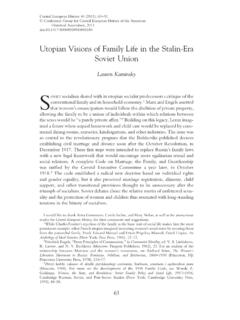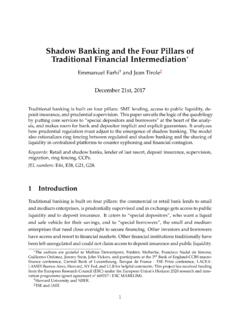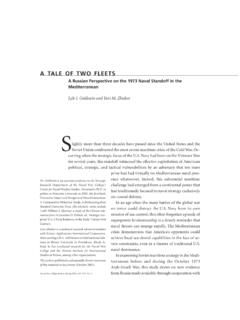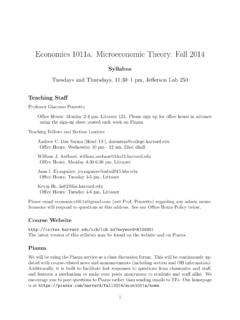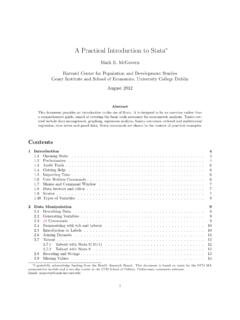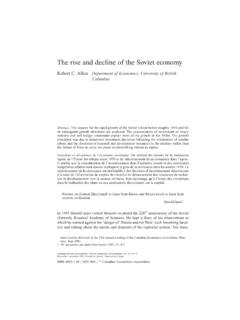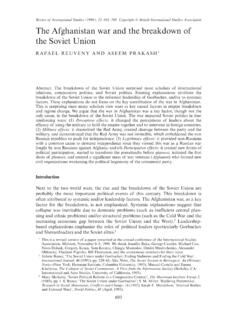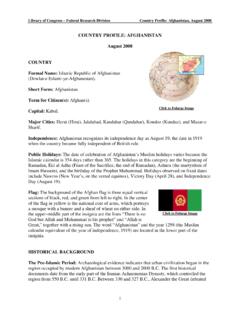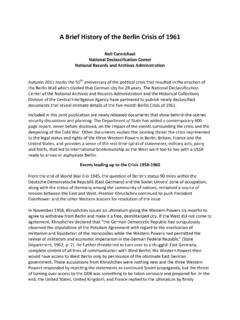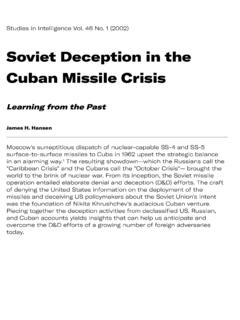Transcription of Stalin’s Terror and the Long-Term Political Effects of ...
1 Stalin s Terror and the Long-Term PoliticalEffects of Mass RepressionYuri M. Zhukov and Roya TalibovaDepartment of Political ScienceUniversity of MichiganJune 22, 2017 AbstractRepression has a Long-Term negative effect on Political millions of arrest records from archival documents, and polling-station level election results, we examine how past exposure to repres-sion during the Stalin era has affected voter turnout in Putin s identify the effect of repression on voting, we use an instrumen-tal variable design, exploiting exogenous variation in repression dueto the structure of mid-century soviet railroads, and travel distancesto Gulag camps.
2 We find that communities more heavily repressedunder Stalin are consistently less likely to vote today. The electorallegacy of Stalin s Terror decades after the soviet collapse, and acrossmultiple election cycles (2003-2012) is systematically lower show that our result is not unique to the Putin regime, we repli-cate our analysis in neighboring Ukraine (2004-2014), and find similarpatterns. These results challenge emerging findings that exposure toviolence increases Political count: 99381 Reflecting on his years in correctional labor camps, soviet writer and dissi-dent Varlam Shalamov said, He who has been there will never forget (Hosking, 1991).
3 During Josef Stalin s three decades in office, the So-viet Union convicted million people for counter-revolutionary crimes(GARF, 1954). The Gulag an acronym for Main Directorate of Cor-rective Labor Camps and Labor Settlements was among the defininginstitutions of the USSR. Millions experienced the camps first hand, butmany more felt their impact indirectly through disappearances of friends,neighbors, and the transformation of their communities. What is the Long-Term legacy of Stalin s Terror ? Has exposure to Political repression in thepast made these communities less or more politically active today?
4 In this article, we empirically examine the effect of Stalin s Terror on po-litical participation in contemporary Russia. Using archival arrest recordscollected by the human rights organization Memorial, we estimate eachRussian locality s exposure to repression during the Stalin era, and theeffect of this repression on local voting patterns between 2003 and find that communities more heavily repressed under Stalin are signifi-cantly less likely to vote in Russia s national elections, compared to nearbycommunities less exposed to soviet itself, a negative correlation does not demonstrate that the Terror effectis causal.
5 It is possible that soviet authorities repressed heavily in areas thatalready stood in opposition to the federal government, and these initiallyrestive communities continue to mistrust Moscow today. To address thisconcern, we use an instrumental variable design, exploiting the structureof mid-century soviet railroads and travel distance to Gulag camps. TheSoviet repressive apparatus depended heavily on railroads, which trans-ported prisoners and connected populated areas to Gulags. However, thehistorical structure of the rail network most of which predated Stalin sterror has little direct impact on contemporary voting, apart from itsinfluence on soviet repression.
6 To the extent that railroads also facilitatedmigration and economic development, we show that these alternative path-1ways should bias against finding a significant repression effect. Our resultsconfirm that exposure to repression had a Long-Term negative effect on par-ticipation, equivalent to an percent drop in local turnout in 2012. Weconsider the role of electoral fraud in this process, and show with ananalysis of data on Ukraine that the effect is not unique to Putin s attribute this local decline in turnout to a deterrence of Political activ-ity. By punishing individuals for counter-revolutionary crimes real orimagined and in some cases extending this punishment to family mem-bers, the soviet state raised the expected costs of even seemingly benignpolitical participation.
7 Citizens who lived in communities with a similarlevel of secret police vigilance developed converging expectations of howlikely dissent will be detected (or invented), and how severely it will bepunished. Where these costs have historically been high, local norms havecome to favor an avoidance of Political findings make several novel contributions to research on polit-ical violence (Kalyvas, 2006; Lyall, 2009), repression (Mason and Krane,1989; Davenport, 2007), and voting (Colton and Hale, 2009; Treisman, 2011).First, our results reinforce recent findings on the negative consequences ofrepression for Political behavior (Balcells, 2012; Bautista, 2015), and chal-lenge the emerging view that exposure to violence increases participation(Bellows and Miguel, 2009; Blattman, 2009; Bateson, 2012).
8 Second, whilepast research has emphasized the short-term Effects of repression over sev-eral months or years (Almeida, 2003; Boswell and Dixon, 1990; Gurr andMoore, 1997), we show that these Effects may be durable over generations,sowing Long-Term distrust of Political institutions. Third, unlike recent re-search on the legacy of soviet mass deportations (Lupu and Peisakhin,2016; Rozenas, Schutte and Zhukov, 2017), we show that repression neednot be collective or indiscriminate to have community-level and Political participationThe question of who participates in politics matters greatly for public pol-icy and democratic development, because it shapes the set of preferencesand opinions to which the government in non-democraticstates, regimes often look to the electoral process as a source of legitimacyand corrective feedback (Brownlee, 2007; Magaloni, 2006.)
9 Schedler, 2006).To the extent that state repression might shape the makeup of an electorate determining who votes and who stays at home the electoral legacy ofviolence is of great importance for the theory and practice of Political effect of repression has been a matter of some debate. Sev-eral recent studies have found that exposure to violence increases polit-ical engagement (Bellows and Miguel, 2009; Blattman, 2009; Bratton andMasunungure, 2007; Garc a-Ponce and Pasquale, 2015). Explanations forthis effect have included backlash mobilization, where communities reactto violence by aligning with the perpetrator s opponent (Francisco, 2004),and substitution Effects , where victims channel resistance into non-violentforms of contestation (Lichbach, 1987).
10 More recent studies have empha-sized post-traumatic growth, where exposure to violence yields psycho-logical Effects that increase social cohesion, altruism and collective coping(Bauer et al., 2016; Blattman, 2009; Gilligan, Pasquale and Samii, 2014), and expressive participation, where voting is a means for victims empower-ment (Schuessler, 2000; Bateson, 2012).An important shortcoming of this literature is its empirical focus onwartime violence by non-state actors and weak states who are generally1We defineparticipationas actions aimed at influencing the selection of governmentpersonnel and/or the actions they take (Verba and Nie, 1972, 2).
